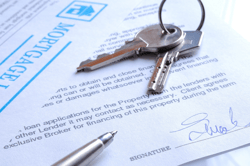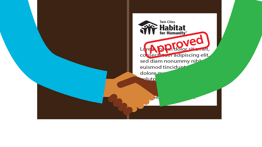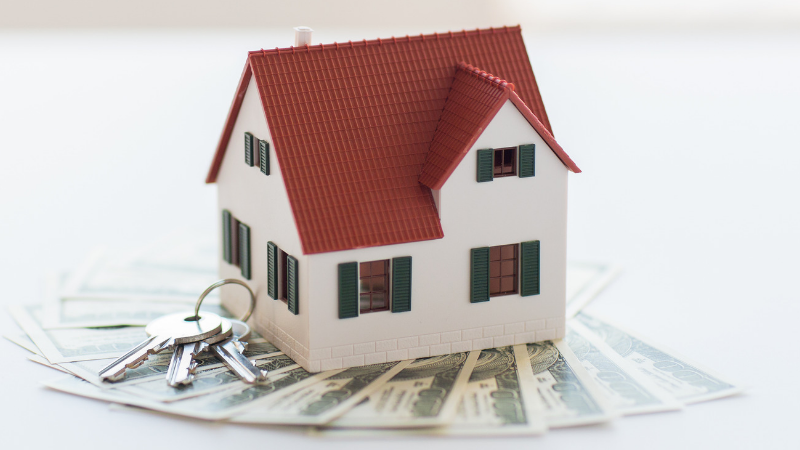How Much Money Do You Need to Buy A House?
There are many factors that go into determining how much money you will need to buy a house. While you may have considered the down payment and your...
3 min read
 Twin Cities Habitat for Humanity
:
12:17 PM on December 9, 2021
Twin Cities Habitat for Humanity
:
12:17 PM on December 9, 2021
![How Interest Rates Work and Impact The Cost of a Home [VIDEO]](https://www.tchabitat.org/hubfs/webpage%20images/infographic/16%20x%209%20images/submit%20loan%20application.png)
How much do you really pay when you buy a home?
A loan you take out to buy a house is called a mortgage. The mortgage is usually a little less than the selling price of the house (depending on the size of your down payment). But despite the lower initial cost, you will actually end up paying thousands of dollars more.
From the day you take out the loan until you pay it off, the loan collects interest. Interest is what the lender charges for the loan. As the homeowner, you pay back the whole asking price of the home plus the interest.
Every mortgage has its own interest rate. The rate is a percentage of the whole loan amount that gets charged to you every year. This amount is added on top of the amount you owe. The lower your interest rate, the less you pay. It really adds up over time so you want your interest rate to be as low as possible.
Mortgage interest rates in the United States are currently running between 2% and 4%.
If you have a fixed-rate mortgage, you never have to worry about it changing. Your interest rate will remain the same for the whole life of your loan. You will always know exactly what you owe on your loan every month. The lowest-cost mortgage loans are fixed-rate loans at a low-interest rate.
An adjustable-rate mortgage is different. Your interest rate changes over time. It usually starts with a fixed rate. After a certain amount of time passes, the lender can adjust the rate. The change in rates is based on an “index rate” that is defined by the finance industry. The lender adds a certain amount of profit on top of that.
Adjustable-rate mortgages can be unpredictable. Often adjustable-rate mortgages start with a lower rate than fixed-rate mortgages, but there’s no guarantee the rate will stay low. If interest rates are going down in the economy, you will pay less. If they are going up, you will pay more. There is no way to predict this in advance. The economy can change a lot in five years! So, the rates can go up or down.
The lowest interest rate is always the best. But how much of a difference does it make?
The median listing price for homes in Minneapolis and St. Paul was $345,000 in September 2021. That means half of the homes for sale were more expensive and half were less expensive.
Let’s look at a loan for $345,000. It has a fixed interest rate and will last for 30 years. This is the most common kind of mortgage loan. Some mortgages last for 20 years, but it is unusual.
That’s a big difference: Nearly $134,000 more between the 2% rate and the 4% rate. If you’re not careful, you’ll end up paying for your new home twice over!
Naturally, this changes your monthly payments as well.

The figures above represent a conventional home loan. A conventional mortgage is one you get from a bank. The bank will look at your income to decide how much to lend you. Conventional loans usually require a big down payment. If you cannot afford a significant down payment, you might be required to purchase expensive mortgage insurance.
Let’s look at two alternative mortgage options and see how they stack up.
FHA Mortgage
The FHA is the Federal Housing Administration. When you take out an FHA mortgage, you don’t receive money directly from the FHA. Instead, you get a loan from a lender that follows special FHA rules. These rules are meant to make buying a home more accessible for low- and moderate-income homebuyers.
An FHA loan requires a 3.5% down payment, which is often lower than what is required on non-FHA mortgages.
FHA loan interest rates for the past few years have been between 2.9% and 3.4%:
TruePath Mortgage
The TruePath Mortgage is available only through TCHFH Lending, Inc., a nonprofit mortgage lending subsidiary of Twin Cities Habitat for Humanity. TCHFH Lending, Inc. provides this mortgage for low- and moderate-income households across the Twin Cities metro area. The TruePath Mortgage can require no down payment from the homebuyer with a 2.0% fixed interest rate.*
The TruePath Mortgage isn’t the best choice for everyone. But if it’s right for you, it could save you significant money over the long term.
Your gift unlocks bright futures! Donate now to create, preserve, and promote affordable homeownership in the Twin Cities.

There are many factors that go into determining how much money you will need to buy a house. While you may have considered the down payment and your...

If you're beginning the journey of buying your first home, it is critical to have an understanding of employment requirements to be eligible for a...

Buying your first home is a complex process (here’s a guide that could help you). A big part of it is selecting the right mortgage. It’s a financial...